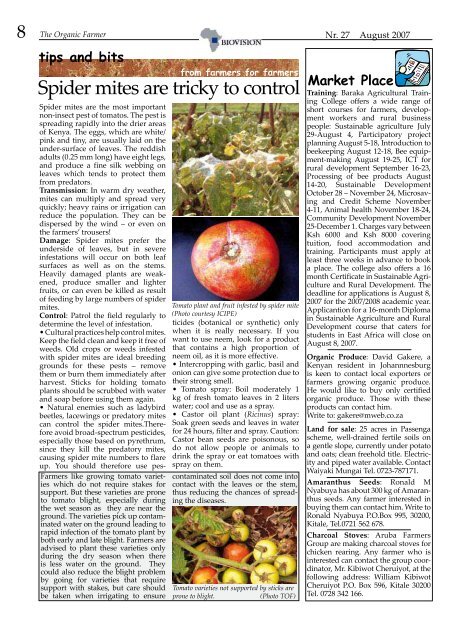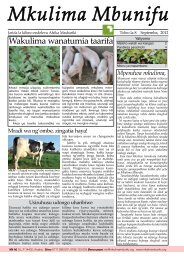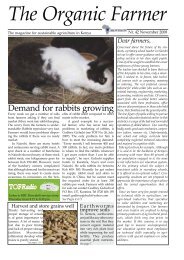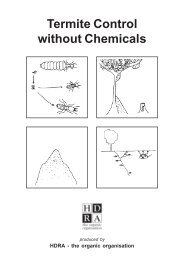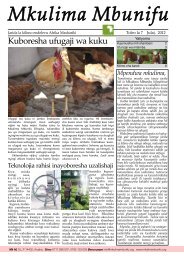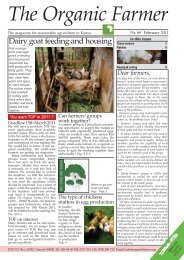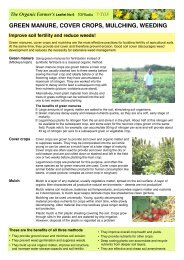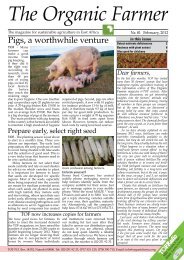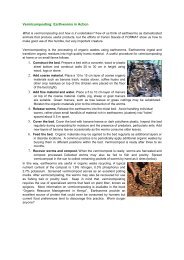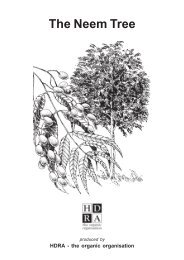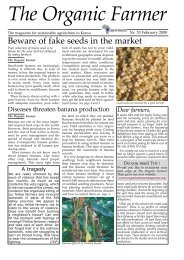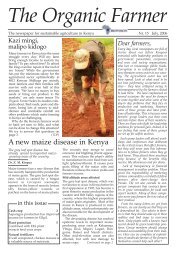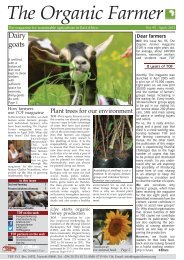Green manure is best fertilizer - Infonet-Biovision
Green manure is best fertilizer - Infonet-Biovision
Green manure is best fertilizer - Infonet-Biovision
You also want an ePaper? Increase the reach of your titles
YUMPU automatically turns print PDFs into web optimized ePapers that Google loves.
Nr. 27 August 2007<br />
Spider mites are tricky to control<br />
Spider mites are the most important<br />
non-insect pest of tomatos. The pest <strong>is</strong><br />
spreading rapidly into the drier areas<br />
of Kenya. The eggs, which are white/<br />
pink and tiny, are usually laid on the<br />
under-surface of leaves. The redd<strong>is</strong>h<br />
adults (0.25 mm long) have eight legs,<br />
and produce a fine silk webbing on<br />
leaves which tends to protect them<br />
from predators.<br />
Transm<strong>is</strong>sion: In warm dry weather,<br />
mites can multiply and spread very<br />
quickly; heavy rains or irrigation can<br />
reduce the population. They can be<br />
d<strong>is</strong>persed by the wind – or even on<br />
the farmers’ trousers!<br />
Damage: Spider mites prefer the<br />
underside of leaves, but in severe<br />
infestations will occur on both leaf<br />
surfaces as well as on the stems.<br />
Heavily damaged plants are weakened,<br />
produce smaller and lighter<br />
fruits, or can even be killed as result<br />
of feeding by large numbers of spider<br />
mites.<br />
Control: Patrol the field regularly to<br />
determine the level of infestation.<br />
• Cultural practices help control mites.<br />
Keep the field clean and keep it free of<br />
weeds. Old crops or weeds infested<br />
with spider mites are ideal breeding<br />
grounds for these pests – remove<br />
them or burn them immediately after<br />
harvest. Sticks for holding tomato<br />
plants should be scrubbed with water<br />
and soap before using them again.<br />
• Natural enemies such as ladybird<br />
beetles, lacewings or predatory mites<br />
can control the spider mites.Therefore<br />
avoid broad-spectrum pesticides,<br />
especially those based on pyrethrum,<br />
since they kill the predatory mites,<br />
causing spider mite numbers to flare<br />
up. You should therefore use pes-<br />
Farmers like growing tomato varieties<br />
which do not require stakes for<br />
support. But these varieties are prone<br />
to tomato blight, especially during<br />
the wet season as they are near the<br />
ground. The varieties pick up contaminated<br />
water on the ground leading to<br />
rapid infection of the tomato plant by<br />
both early and late blight. Farmers are<br />
adv<strong>is</strong>ed to plant these varieties only<br />
during the dry season when there<br />
<strong>is</strong> less water on the ground. They<br />
could also reduce the blight problem<br />
by going for varieties that require<br />
support with stakes, but care should<br />
be taken when irrigating to ensure<br />
Tomato plant and fruit infested by spider mite<br />
(Photo courtesy ICIPE)<br />
ticides (botanical or synthetic) only<br />
when it <strong>is</strong> really necessary. If you<br />
want to use neem, look for a product<br />
that contains a high proportion of<br />
neem oil, as it <strong>is</strong> more effective.<br />
• Intercropping with garlic, basil and<br />
onion can give some protection due to<br />
their strong smell.<br />
• Tomato spray: Boil moderately 1<br />
kg of fresh tomato leaves in 2 liters<br />
water; cool and use as a spray.<br />
• Castor oil plant (Ricinus) spray:<br />
Soak green seeds and leaves in water<br />
for 24 hours, filter and spray. Caution:<br />
Castor bean seeds are po<strong>is</strong>onous, so<br />
do not allow people or animals to<br />
drink the spray or eat tomatoes with<br />
spray on them.<br />
contaminated soil does not come into<br />
contact with the leaves or the stem,<br />
thus reducing the chances of spreading<br />
the d<strong>is</strong>eases.<br />
Tomato varieties not supported by sticks are<br />
prone to blight.<br />
(Photo TOF)<br />
Training: Baraka Agricultural Training<br />
College offers a wide range of<br />
short courses for farmers, development<br />
workers and rural business<br />
people: Sustainable agriculture July<br />
29-August 4, Participatory project<br />
planning August 5-18, Introduction to<br />
beekeeping August 12-18, Bee equipment-making<br />
August 19-25, ICT for<br />
rural development September 16-23,<br />
Processing of bee products August<br />
14-20, Sustainable Development<br />
October 28 – November 24, Microsaving<br />
and Credit Scheme November<br />
4-11, Animal health November 18-24,<br />
Community Development November<br />
25-December 1. Charges vary between<br />
Ksh 6000 and Ksh 8000 covering<br />
tuition, food accommodation and<br />
training. Participants must apply at<br />
least three weeks in advance to book<br />
a place. The college also offers a 16<br />
month Certificate in Sustainable Agriculture<br />
and Rural Development. The<br />
deadline for applications <strong>is</strong> August 8,<br />
2007 for the 2007/2008 academic year.<br />
Applicantion for a 16-month Diploma<br />
in Sustainable Agriculture and Rural<br />
Development course that caters for<br />
students in East Africa will close on<br />
August 8, 2007.<br />
Organic Produce: David Gakere, a<br />
Kenyan resident in Johannnesburg<br />
<strong>is</strong> keen to contact local exporters or<br />
farmers growing organic produce.<br />
He would like to buy only certified<br />
organic produce. Those with these<br />
products can contact him.<br />
Write to: gakere@mweb.co.za<br />
Land for sale: 25 acres in Passenga<br />
scheme, well-drained fertile soils on<br />
a gentle slope, currently under potato<br />
and oats; clean freehold title. Electricity<br />
and piped water available. Contact<br />
Waiyaki Mungai Tel. 0723-787171.<br />
Amaranthus Seeds: Ronald M<br />
Nyabuya has about 300 kg of Amaranthus<br />
seeds. Any farmer interested in<br />
buying them can contact him. Write to<br />
Ronald Nyabuya P.O.Box 995, 30200,<br />
Kitale, Tel.0721 562 678.<br />
Charcoal Stoves: Aruba Farmers<br />
Group are making charcoal stoves for<br />
chicken rearing. Any farmer who <strong>is</strong><br />
interested can contact the group coordinator,<br />
Mr. Kibiwot Cheruiyot, at the<br />
following address: William Kibiwot<br />
Cheruiyot P.O. Box 596, Kitale 30200<br />
Tel. 0728 342 166.


